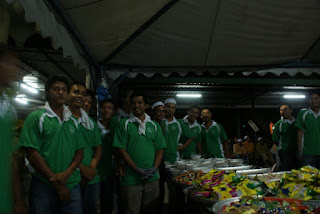Himanshu Bhatt
IN the course of my many field trips, I once found a destitute washerwoman living in a wooden shack in George Town while struggling to support her family on a meagre income of RM300 a month. At 42, the woman was gritty enough to try and surmount her problems, managing to make other paltry earnings by cleaning toilets and doing household chores for people.
I still remember how deeply, when I spoke to her, she expressed a yearning to be self-reliant with a job or business that could alleviate her painful situation, for the sake of her children.
People like this washerwoman now have an opportunity to work towards a more dignified life with the help of a microcredit aid scheme recently initiated in Penang. Dubbed the "People’s equality bridging project", the scheme was announced last month as a joint effort between the Penang Development Corporation (PDC) and Universiti Sains Malaysia.
Backed by a revolving fund, the scheme, which involves the issuance of very small loans, is for those at the bottom rungs of the income pyramid. These include people like single mothers and the disabled who rely on welfare aid, as well as petty traders scraping on an income of less than RM400 a month each for their families.
The introduction of microcredit in Penang is part of an inspirational movement that has been spreading across the developing world for the past couple of years. As is well recorded, the rising popularity of micro-financing is linked to the success of organisations in Bangladesh like the Grameen Bank, founded by Muhammad Yunus who received the Nobel Peace Prize for his ground-breaking accomplishments in 2006.
What makes microcredit particularly appealing is that while it benefits common people by allowing for creation of self-employment, it is also rather cost-effective to operate and maintain. Compared to many other programmes launched to uplift the socio-economic status of the masses, microcredit programmes require much less resources from the authorities and implementers.
And the potential economic benefits brought about by the ripples of new activities spun out from the funds are plenty.
Interestingly enough, in places like Bangladesh and India, where the programme has been implemented among literally millions of adult household members, the default record is also extremely low. Most people pay back what little has been loaned to them.
In Penang, the state government and PDC have each allocated RM1.5 million for the fund for a period of three years. The maximum loan allowed by a single applicant is RM5,000. The loans are scheduled to be distributed from Oct 1.
Interestingly, the scheme is also yet another egg in the basket of the quasi-socialist policies that the DAP-led state administration has been introducing since last year.
As it is, the state has already launched its now well-known policy to give direct cash to hardcore poor families on a monthly basis. Last year, the welfare department distributed bags of rice to a few thousand aid recipients in a gesture to help those affected by rising food prices. A senior citizens appreciation programme is also being planned for next year to hand out cash to every Penangite above the age of 60.
Added to all these is the state’s contentious soft stance towards unlicensed petty traders, made famous immediately after Pakatan Rakyat took power in March last year when all summonses involving hawker licences and parking offences were waived.
What makes the state’s participation additionally intriguing is that it is bound to bring about certain political mileage.
The microcredit issue was one of the points consistently raised by Pakatan Rakyat leaders during the recent campaigning for the Permatang Pasir state by-election. Reporters who covered the campaign rounds in villages and rural areas kept hearing Pakatan leaders extolling the virtues of the new scheme.
I myself saw personalities like PKR’s
Mansor Othman, the deputy chief minister, and Mohamad Sabu from PAS trying to engage farmers, planters and petty traders on the merits of reaping benefit from the microcredit system.
But it should be noted that the microcredit scheme is only meant to kick-start the improvement of the poor. Financial critics have warned of the danger of societies becoming over-dependent on such aid from the authorities. Another factor to be addressed is the importance of a monitoring mechanism to ensure that money that is given out is genuinely used for the purposes stated by the borrowers and their families.
At the heart of the matter, however, the microcredit scheme is still regarded as a practical and proven instrument for socio-economic growth. It provides a family with a springboard to have sustainable sources of household incomes, leading to fulfilment of basic needs like improvements in food and nutrition, and better quality housing.
For the hundreds of impoverished people, like the struggling washerwoman, it may be the most opportune avenue provided by the state that they can now resort to, in order to stand on their own feet, with the dignity they have long craved.
Himanshu is theSun’s Penang bureau chief. Comments: letters@thesundaily.com


























